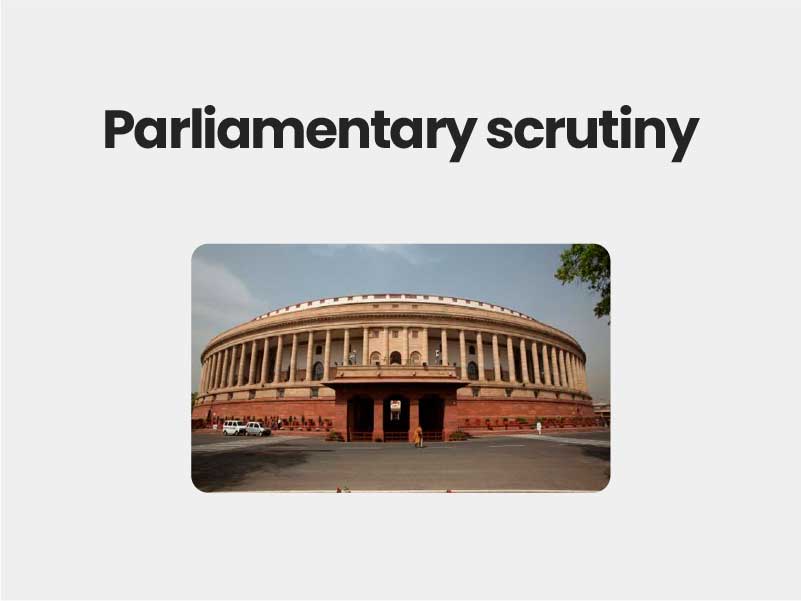Companion@360 → 7 Month programme to sharpen your writing skills → REGISTER NOW

Parliamentary scrutiny
Parliamentary scrutiny – The new Farm bills passed by parliament in the last monsoon session have evoked a scale of protest unforeseen by the government. Over the years, the Indian Parliament has increasingly adopted the committee system as did the other democracies in the world. This helped in housekeeping, to enhance the efficacy of the House to cope with the technical issues confronting it and to feel the public pulse. But the committee approach also helped to guard its turf and keep it abreast to exercise accountability on the government.
Parliamentary Committees:
- Parliamentary Committees are of two kinds – Standing Committees and ad hoc Committees. The former are elected or appointed every year or periodically and their work goes on, more or less, on a continuous basis.
- The latter are appointed on an ad hoc basis as need arises and they cease to exist as soon as they complete the task assigned to them.
- Standing Committees: Among the Standing Committees, the three Financial Committees – Committees on Estimates, Public Accounts and Public Undertakings – constitute a distinct group as they keep an unremitting vigil over Government expenditure and performance.
- While members of the Rajya Sabha are associated with Committees on Public Accounts and Public Undertakings, the members of the Committee on Estimates are drawn entirely from the Lok Sabha.
- The Estimates Committee reports on ‘what economies, improvements in organisation, efficiency or administrative reform consistent with policy underlying the estimates’ may be effected.
- It also examines whether the money is well laid out within limits of the policy implied in the estimates and suggests the form in which estimates shall be presented to Parliament. The Public Accounts Committee scrutinises appropriation and finance accounts of Government and reports of the Comptroller and Auditor-General.
- It ensures that public money is spent in accordance with Parliament’s decision and calls attention to cases of waste, extravagance, loss or nugatory expenditure. The Committee on Public Undertakings examines reports of the Comptroller and Auditor-General, if any.
- It also examines whether public undertakings are being run efficiently and managed in accordance with sound business principles and prudent commercial practices.
- Besides these three Financial Committees, the Rules Committee of the Lok Sabha recommended setting-up of 17 Department Related Standing Committees (DRSCs).
- Accordingly, 17 Department Related Standing Committees were set up on 8 April 1993. In July 2004, rules were amended to provide for the constitution of seven more such committees, thus raising the number of DRSCs from 17 to 24. The functions of these Committees are:
- To consider the Demands for Grants of various Ministries/Departments of Government of India and make reports to the Houses;
- To examine such Bills as are referred to the Committee by the Chairman, Rajya Sabha or the Speaker, Lok Sabha, as the case may be, and make reports thereon;
- To consider Annual Reports of ministries/departments and make reports thereon; and
- To consider policy documents presented to the Houses, if referred to the Committee by the Chairman, Rajya Sabha or the Speaker, Lok Sabha, as the case may be, and make reports thereon.
Parliamentary scrutiny – Challenges
- Committees of scrutiny and advice, both standing and ad hoc, have been confined to the margins or left in the lurch in the last few years.
- While 60% of the Bills in the 14th Lok Sabha and 71% in the 15th Lok Sabha were wetted by the DRSCs concerned, this proportion came down to 27% in the 16th Lok Sabha.
- The government has shown extreme reluctance to refer Bills to Select Committees of the Houses or Joint Parliamentary Committees.
Our Parliamentary Committees have a tradition of working in a non-party manner. The reports of these committees are based on consensus. It may be a bit difficult for people to believe that the instrumentalities of parliament could rise above parties.
But that is how they function.The systems of parliament are inclusive. They have the capacity to harmonise contradictions.
Despite the adversarial politics playing out in full force in the House, the calm atmosphere prevailing in the committee rooms and the purposiveness shown by the members in dealing with issues are a tremendously reassuring factor. To make these systems gradually non-functional and irrelevant is to invite disaster.
